
(ارشيف – نالافوريو) ;من اليمين; اغا بطرس ايليا, اغا مرزا ايليا , مالك خوشابا مالك يوسف وبجانبهم مجموعة من الضباط الروس وخلفهم مقاتلين اخرين.
From the right; Agha Poutros Elia, Agha Mirza Elia, Malik Khoshaba Malik Yousif, and next to them is a group of Russian officers, succeeded by other fighters
С правой стороны; Ага Путрос Элия, Ага Мирза Элия, Малик Хошаба Малик Юсиф А рядом с ними группа русских офицеров и других бойцов за ними
************************************************************************************************
A Belgian Colonel at the Iraqi Border
http://www.shlama.be
End 1924 the League of Nations decided to send out the Mosul Commission. It had to gather material that would allow to solve the hot issue of the frontier between Turkey and the new state of Iraq under British mandate. One of its three members was a Belgian, Colonel Albert Paulis. In this article, Marc Dassier reveals details from his diary, which was written in 1925. Albert Paulis – a hero of the Great War and a most honourable man who was touched by the fate of the Assyrian Christians
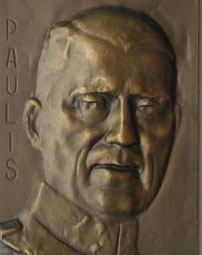
In 1924, the League of Nations had to arbitrate the problem of the disputed frontier between Turkey and the British protectorate of Iraq. The main issue was the British claim that the Mosul region should be incorporated into the new state of Iraq. The Mosul region was a former province or vilayet of the Ottoman Empire, it was rich in oil and had a large Kurdish population. The League of Nations sent a frontier commission to the area. Its three commissioners investigated the situation in the Mosul region from January to March 1925 and reported their conclusions to the League. The commissioners were Einar af Wirsén (Sweden, chairman of the Commission), Count Pal de Teleki (Hungary) and Col. Albert Paulis (Belgium). In his diary Albert Paulis described his observations and their explosive political context
Muslims and Minorities
According to A. Paulis, King Faisal of Iraq stated in his welcome speech to the Commission that the Mosul Vilayet had a population of 300.280. There were 173.000 Arabs, the others belonged to minorities: 59.380 Kurds, 16.000 Turkomans, 30.000 Christians, mainly Chaldeans, 6000 Jews, 14.900 Yezidis and 1000 from other religions. This means that according to King Faisal, the region was predominantly inhabited by Arabs. This is in contradiction with a document from Einar af Wirsén on the ethnic composition in the Mosul Vilayet including Kirkuk: the Commission stated that with half a million out of 800.000 people the Kurds were the majority in the Mosul-Kirkuk region
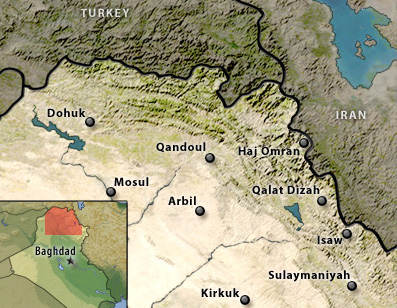
Map of northern Iraq – the area where the Mosul Commission had to work in 1925
In any case, these statistics confirmed the existence of important minorities in the disputed area. A lot of people of all communities were interviewed by the Commission in various localities in the Mosul Vilayat. It soon became obvious that the Commission had to work in a melting pot of cultures and religions and that it would have to inform the League of Nations Council on the poor status of persecuted minorities, mostly Christians. On the other hand, Paulis explained to the representatives of the minorities that the Commission had to focus on the accuracy of the northern frontier between Iraq and Turkey, according to the Brussels Line established at the Brussels Conference of the League of Nations, rather than to promote an impossible autonomy for each minoritiy
Tales of Horror
A. Paulis wrote in his diary that the Assyrians sided with the Russians in the First World War. After the retreat of the Russians and also after the Great War, the Assyrians sided with the British against the Turks, who organized another punitive expedition against them in 1924. The Assyrians had to run and from September 1924 onwards they were temporarily sheltered in and around Mosul. According to Albert Sassoon, director of the Israelite Alliance schools in Iraq, the Christians were persecuted by the Turks during the Great War because they had attempted to get rid of the Ottoman Empire, but the Jews were left in peace because of their neutrality
A. Paulis met Mgr de Berré, Catholic archbishop of Baghdad and apostolic delegate to Iraq, who was in the Turkish city of Mardin in 1915 when the Christians were slaughtered there. A delegation of refugees from Jezira or Cizre in Turkey – three men and a woman – told horrible stories about what happened in 1915. Particularly touching was the fate of the woman, whose family and children were massacred under her eyes by Kurds during a pillage. Four of her nieces were sold many times, they were still in the hands of Kurdish aghas and she had no news from them. The woman, originally rich, had to become a maidservant. The Turks sold the Christian properties to local Kurds at a ridiculous price and even that little money was never received. When the fugitives arrived in Zakho from Cizre, they were protected by the local leader Mohammed Agha, who was opposed to the massacres
Some other ecclesiastics reported that after the Great War the Christians were no longer slaughtered in Turkey, but they also mentioned that after the Greek invasion into Turkey and the war of the Turkish Republic against that invasion in 1923, the Christians were expulsed from Turkey. In fact, the kemalist government in the Turkish Republic under Atatürk was more xenophobic and anti-Christian than ever. According to Mgr Joseph Simon, patriarchal vicar of the Persian Assyro-Chaldean refugees, these pitiful people, harassed by their Kurdish neighbours, left their homeland in NW Persia at the end of the Great War. From 65.000 they fell to 30.000, due to the massacres and the hardships in exile. The British government kept them in a refugee camp close to Baghdad, but some of them left this torrid plain and returned to their Persian homeland at their own risk. Nothing was heard of them since then
Another episode of ethnic violence was told to A. Paulis by Colonel Lawrence, commander of the Levies Regiment and by other informants. It was known as the Kirkuk Incident. In the summer of 1924 an Assyrian soldier of the city garrison was hit during a futile dispute in the bazaar of Kirkuk. Assyrians put fire to some shops and killed about twenty Muslims. The Assyrian regiment was kept in the barracks when the Muslims from the bazaar retaliated against the local Christians and killed a dozen of them. Both parties blamed each other for the bloodshed. The Christians claimed that the fighting was organized in Turkey; the Muslims said that the Assyrian soldiers acted as if they had conquered the town
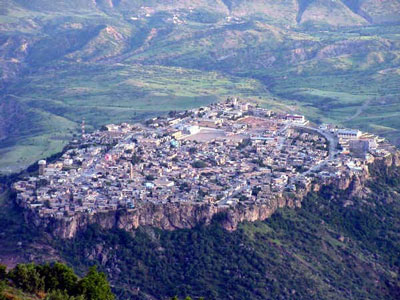
Recent picture of the town of Amadia – northern Iraq
In Dohuk, a town to the north of Mosul, the Commission noticed a lot of Assyrian refugees among an obviously pro-Turkish population. Many inhabitants spontaneously kissed the hand of Javad Pasha, the Turkish assessor to the Commission. Two Chaldean priesters from a village of 200 Christian families, surrounded by Muslim villages, told the Commission that positive contacts with the Muslims were restored after the Turks had left the country. Under Turkish rule Christians were robbed and beaten, most of their claims were ignored and a lot of local Christians disappeared. Paulis noticed that the Christian houses were clustered or built like little fortresses and he wrote We are struck by the difference between the clean and well-built Christian villages and the Turkish and Kurdish villages and towns we visited. Af Wirsén, de Teleki and me share the feeling that we are in a more civilized environment
Other testimonies came from delegates from Amadia, a small town in the mountainous area north-east of Dohuk. In Amadia there were 9000 Assyrians and Chaldeans and 2000 refugees of the Assyrian Tyari tribe from the Hakkari mountains in Turkey. The Amadia delegation was led by Mgr Francis, Chaldean bischop of Amadia, and other priests in this area. According to them, general massacres against the Christians had not taken place there, only isolated murders, and some Turkish officials had encouraged the Kurds to attack the local Christians. Before the Great War daily exactions were coming from the Kurdish aghas and persecutions had increased under the government of the Young Turks. Two years ago, when the Turks had invaded Rawandoz close to the border with Persia, the Kurdish agha Abdul Atif had attacked two Christian villages and slaughtered 72 villagers. Kurds and Christians could leave in peace, but the Kurdish aghas were stirring up their people against the Christians and according to the Christian delegates from Amadia, most Kurdish aghas were in league with the Turkish government
About the Assyrians
Western clerics, who had lived with the Assyrian Christians from Hakkari in Turkey, gave Paulis a description of the former Assyrian homeland. In the past the Assyrian tribes were nearly completely independent in their mountains. They paid a tribute to their patriarch to administer the land and retribute the Turks on an annual basis, in order to be left in peace. The Assyrians had their own laws and traditions, and their customs were very primitive. Murder could be made up by payment, but the family of the victim kept the right to kill the murderer or one of his close relatives. Robbery was subject to a financial penalty. In case of adultery the deceived spouse had the right to take the law into his or her own hands. The possessions of a deceased man were divided among the sons, but the daughters were excluded, because most of the time they married into another clan and personal assets could not go to another tribe
The temporal and religious power was executed by the Assyrian patriarch Mar Shimun, whose High Office had become hereditary within the same family. The patriarch having been slaughtered by the Kurds in 1918, the power was first executed by his brother. A few months later this successor died from illness and was replaced by his nephew, who was consecrated when he was only 11 years old. The present Assyrian patriarch, 17 years old in 1925, was studying in England. So it happened that for the time being the spiritual authority fell to the assembly of the Assyrian bishops, while Lady Surma, the young patriarch’s aunt, got hold of the political leadership
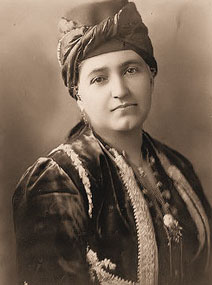
Lady Surma – Mar Shimun’s aunt
The Commission went to see Lady Surma in the Christian district of Mosul. A. Paulis noticed that the women were unveiled in that neighbourhood. Lady Surma’s residence was a modest house, inhabited by some other Assyrian families. She was a middle-aged woman, her youngish face surrounded by white hair. She was dressed in a very elegant European way and according to A. Paulis, her English was fluent and correct. She also revealed to A. Paulis what she thought of Agha Petros, the Assyrian ‘general’ who was in charge of the military operations of the Assyrians in Persia in 1917-1918 and exhorted the Assyrians to keep fighting against the Turks, but did nothing to help the armed forces of patriarch Mar Shimun when close collaboration of all Assyrians was vital on the battlefield. She said: ‘He played a role during the war, but he has no authority to represent the Assyrian people. He is in France now, but nobody supports him and we no longer regard him as one of us
Assyrian claims
The Commission asked the Assyrians about their views on resettlement. If they were incorporated into Turkey or Iraq, would they be satisfied with local autonomy, paying a tribute through their own patriarch, as they did in the past? Some of the Assyrian petitions asked the League of Nations to create a new territory for the Assyrian nation, where they would be fully independent under British protection, without further interference from Turkey or Iraq. Lady Surma clearly stated: ‘With no solution found by the League of Nations, our people will be obliged to become expatriates.’ The Commission also met a very old Assyrian, who opened up his heart and explained what should be done: ‘In the past we were independent and we lived in peace with our neighbours. Today, we are dispersed and we have to live in exile. For many generations we have been Christians and we kept our faith despite all difficulties. We are just asking to get permission to rebuild our churches and our houses. But it should be obvious to all that we also need a territory where we can cultivate the land and feed our people.’ The Commission explained that his wish was impossible, because they would be living in their mountains surrounded by Turks, Arabs and Kurds, and no European power could defend them there against future aggressions
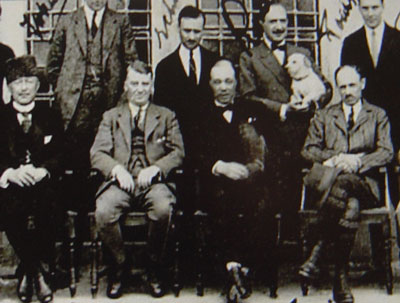
Mosul Commission – Sitting: A.Paulis (second from left) & Af Wirsén & de Teleki
Other Assyrian supplications expressed the wish to remain in Iraq if real protection was guaranteed, since Arab domination would not be able to control the Kurdish aghas. Another bishop stated: ‘With British support safety will be ensured, because the British are strong and feared. If there is only Iraqi domination, there will be anarchy, persecutions and massacres.’ The Commission promised to take into account the miserable situation of the Assyrians. According to A. Paulis, Sir Henry Dobbs, the British High Commissioner to Iraq, had a meeting with the Commission in Baghdad on 24 January 1925. He mentioned the case of the Assyrian Christians and showed a letter, written in April 1924, from the British government in London to the President of the Iraqi Council. In this letter the Iraqi government was recommended to give local autonomy to the Assyrians. It was told that King Faisal had approved of it
Paulis in the Congo
Albert Paulis was born in 1875. He graduated from the Belgian Military School and at the start of the 20th century he was sent by King Leopold II to the Congo Free State, Leopold’s private dominion that became a Belgian colony in 1908. Paulis established Belgian posts in the region of Bahr El Ghazal in southern Sudan. The Belgians wanted to explore, to make scientific observations and to fight against slavery, but above all they wanted to control the region. By predicting a lunar eclipse that took place at the best moment, A. Paulis terrorized the local tribal leaders, the partly arabized and superstitious Azande sultans, and in this way he was the first to gain control over this hostile territory. With the support of the local tribes he resisted the British forces, who had started a siege in response to this new Belgian annexation in the name of King Leopold II
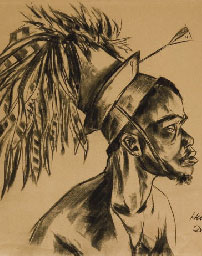
Azande tribal chief 1930
(ATH) A more popular, but historically inaccurate story about this period goes as follows. Paulis and his men crossed the land of the Mangbetu tribe in the remote north-eastern part of the Congo. Being cannibals, these people intended to do their worst when the Belgian expedition met up with them. Fortunately, Paulis had read in his almanac about a moon eclipse that was to take place that same evening. He explained to the Mangbetu chief, that when he or his men were harmed in any way, he would kill the moon. The chief challenged Paulis to prove his power. So, when the moon disappeared that evening, the Mangbetu people believed that Paulis was a great magician and they submitted to Belgian authority. This espisode may even have inspired the famous Belgian cartoonist Hergé in his album Tintin and the Temple of the Sun. In that album Tintin and his companions are about to be burnt at the stake by the Inca rulers. Tintin also knew that a sun eclipse was about to happen and stated that the Inca God of the Sun would show his disapproval when the prisoners were burnt. So, when the eclipse occurred, the terrified Inca rulers released Tintin and his companions. (ATH)
Albert Paulis was also a hero of the Great War. After having been Head of Staff Office for Louis Franck, the Belgian Minister of Colonies, he went back to the Congo, where he was active in various companies and built important railway infrastructure. He was known as Le Broussard or The Bushman and he died in 1933, exhausted by his work. In 1934, the city of Isiro (in Uele, North East Province of the Congo) was renamed Paulis. This place got its old name back under Mobutu’s regime, which destroyed all traces of former Belgian colonization
The British Way
Albert Paulis, a rationalist, was just a well a man of intense emotions. This is made clear in his diary that covers the period when he was active in the Mosul Commission. So, back to Iraq in 1925. At Lady Surma’s house, where Assyrian families were sheltered, he noticed : ‘We observe the women and the childeren walking in the court, they look like poor refugees. This is really heart-rending.’ On another occasion in Mosul he wrote about an Assyrian delegation: ‘How pitiful it is to observe these banished people going away, bending their back under the falling snow. They do not come by car, they have no brass band and no flags, they only keep a firm trust in the future. This reminds me of similar processions in August 1914 along the roads in Belgium, my fatherland.’ Paulis refers to the first days of the Great War, when German troops invaded Belgium and huge crowds of Belgian citizens fled from the aggressors. Belgians on the run and Assyrian refugees – memories and more recent observations are melted together into an appalling scene of blood, sweat and tears
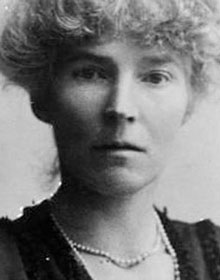
Miss Gertrude Bell
Albert Paulis was touched by the fate of the Assyrian minority in Iraq. He was nevertheless unfairly characterized as a rather dull and not very intelligent man by Miss Gertrude Bell in her letters to her family in England. Gertrude Bell, a famous Middle East-traveller and a distinguished female archeologist, acted as Oriental Secretary to Sir Henry Dobbs, the British High Commissioner in Iraq. She defended and promoted the British interests and her contacts with the members of the Mosul Commission were not always smooth and easy. The chairman of the Commission, Einar af Wirsén, is portrayed by her as ‘a Swede, honest, fat and unintelligent.’ Her description of the third commissioner, the Hungarian count de Teleki, is also blunt. She calls him ‘a little teacher’ and according to her, he is the most capable, but definitely the most dangerous member of the Commission because of his obvious pro-Turkish position. This ‘little teacher’ was in fact a university professor and a famous expert in geography, and he played a major role in Hungarian politics up to 1941, when he committed suicide. As Prime Minister of Hungary in 1920-1921 he became a controversial figure because under his prime ministership the Hungarian parliament passed a first set of anti-Jewish laws that excluded non-Christians from attending university
Paulis wrote that on the occasion of a dinner he criticized Miss Bell and stated that her openly quarrelsome attitude towards the Turkish guests was intolerable. This episode may have upset her and it may have stirred up her prejudices against him. On the other hand and in spite of her distrust of the Turks, Miss Bell described Javad Pasha, the Turkish delegate in the Commission, as an old and harmless assessor. Was he really so peaceful? A. Paulis wrote in his diary that in September 1924, only a few monts before the arrival of the Commission in Iraq, General Javad Pasha led an attack of Turkish troops against the Assyrians in the area of Amadia. This ‘harmless’ man also organized in 1915 the strong Turkish defence of the Galipoli Peninsula against the Anglo-French military expedition in the Dardanelles
The Mosul Commission had been received in Turkey before coming to Iraq. That was sufficient for Gertrude Bell and other British officials in Iraq to suspect its members of being pro-Turkish. The Commission nevertheless clearly marked the frontier between Turkey and Iraq in its report to the League of Nations. Iraq under British mandate got the Mosul Vilayat, Turkey kept the Hakkari mountains. What about the Assyrians? They got nothing, they only kept the memories of their lost homeland in those mountains. Gertrude Bell died a lonely death in Baghdad in 1926
Adapted from the English text by Marc Dassier (editing & illustrations – ATH)
See also original French article by Marc Dassier: Le carnet irakien du Col. Albert Paulis
**********************************************************

حدث تاريخي وتعليق
Historical Event and Commentary
Историческое событие и комментарий
http://nala4u.com
quotation
Lady Surma – Mar Shimun’s aunt
The Commission went to see Lady Surma in the Christian district of Mosul. A. Paulis noticed that the women were unveiled in that neighbourhood. Lady Surma’s residence was a modest house, inhabited by some other Assyrian families. She was a middle-aged woman, her youngish face surrounded by white hair. She was dressed in a very elegant European way and according to A. Paulis, her English was fluent and correct. She also revealed to A. Paulis what she thought of Agha Petros, the Assyrian ‘general’ who was in charge of the military operations of the Assyrians in Persia in 1917-1918 and exhorted the Assyrians to keep fighting against the Turks, but did nothing to help the armed forces of patriarch Mar Shimun when close collaboration of all Assyrians was vital on the battlefield. She said: ‘He played a role during the war, but he has no authority to represent the Assyrian people. He is in France now, but nobody supports him and we no longer regard him as one of us
The British Way
Albert Paulis, a rationalist, was just a well a man of intense emotions. This is made clear in his diary that covers the period when he was active in the Mosul Commission. So, back to Iraq in 1925. At Lady Surma’s house, where Assyrian families were sheltered, he noticed : ‘We observe the women and the childeren walking in the court, they look like poor refugees. This is really heart-rending.’ On another occasion in Mosul he wrote about an Assyrian delegation: ‘How pitiful it is to observe these banished people going away, bending their back under the falling snow. They do not come by car, they have no brass band and no flags, they only keep a firm trust in the future
The quote ended
التعليق;
ذكرت المرحومة سورما خانم عن الزعيم الآشوري اغا بطرس ايليا ما يلي;
لقد لعب دورًا خلال الحرب ، لكن ليس لديه أي سلطة لتمثيل الشعب الآشوري. إنه الآن في فرنسا ، لكن لا أحد يدعمه ولم نعد نعتبره واحدًا منا .
وهنا نود ان نذكر ما يلي ;-
اولا; تتغاضى المرحومة سورما خانم عن الاشخاص والتهم الملفقة التي ادت الى تجريد الزعيم الآشوري اغا بطرس ايليا من سلطته ونفيه الى فرنسا وفرض الاقامة الجبرية على رفيقه التوأم مالك خوشابا مالك يوسف.
ثانيا; الاشوريين وبما فيهم الاشوريين الازيديين والارمن والمسيحيين ..كلهم كانوا داعمين للزعيمين الآشوري اغا بطرس ايليا ورفيقه التوأم مالك خوشابا مالك يوسف إلا الفئة القليلة والمحسوبة على الانكليز وغيرهم .
ثالثا;لم نعد نعتبره واحدًا منا….هكذا تصف المرحومة سورما خانم لاغا بطرس..فهل يليق هذا الوصف بالزعيم الاشوري اغا بطرس ؟ ندع الاجابة للقراء الاعزاء .
رابعا; الفئة القليلة من ((الاشوريين)) والمحسوبين على الانكليز وغيرهم ممن جعلوا الاشوريين يبدون كلاجئين فقراء وفي حالة يرثى لهم وكأشخاص منبوذين ، ثني ظهورهم تحت الثلوج المتساقطة .
موقع http://nala4u.com ملزم بالتسمية الآشورية كأمة وتاريخ ولغة وغير ملزم ما يسمى بكردستان
*********************************
comment
The late Surma Khanem told of the Assyrian leader Agha Poutros Elia the following
He played a role during the war, but had no authority to represent the Assyrian people. He is now in France, but no one supports him and we no longer consider him one of us
Here we would like to mention the following
Firstly; The late Surma Khanem condoned the persons and fabricated charges that led to the deprivation of Assyrian leader Agha Poutros Elia from his authority and his exile to France and the imposition of house arrest on his twin companion Malik Khoshaba Malik Yousif
Second; The Assyrians, including the Assyrians Azidis, the Armenians, and the Christians … all supported the Assyrian leaders Agha Poutros and his twin companion, Malik Khoshaba, Malik Yousif, except for the few who are affiliated of Britain and others
Thirdly, we no longer consider him one of us … This is how the late Surma Khanem describes Agha Poutros … Is this description worthy of the Assyrian leader Aga Poutros? we let the answer for dear readers
Fourthly; The few people of the Assyrians, who are affiliated Britain and others who caused it, the Assyrians look like poor refugees and in a deplorable state and as pariahs, bend their backs under the falling snow
The http://nala4u.com adheres to the Assyrian naming as a nation, history, language and is not binding as so-called Kurdistan
***********************************
комментарий
Покойный Сурма Ханем сказал об ассирийском лидере Аге Путросе Элии следующее
Он играл роль во время войны, но не имел полномочий представлять ассирийский народ. Сейчас он во Франции, но никто его не поддерживает, и мы больше не считаем его одним из нас
Здесь мы хотели бы упомянуть следующее
В первую очередь; Покойный Сурма Ханем оправдал лиц и сфабриковал обвинения, которые привели к лишению ассирийского лидера Ага Путроса Элии от его власти и его изгнанию во Францию и наложению домашнего ареста на его спутника-близнеца Малика Хошабу Малика Юсифа
Во-вторых, Ассирийцы, в том числе ассирийцы Азиди, армяне и христиане … все поддерживали ассирийских лидеров Ага Путроса и его двойника, Малика Хошабу, Малика Юсифа, за исключением немногих, которые связаны с Великобританией и другими
В-третьих, мы больше не считаем его одним из нас … Вот как покойный Сурма Ханем описывает Ага Путроса … Достойно ли это описание ассирийского лидера Аги Потроса? мы даем ответ для дорогих читателей
В-четвертых, Те немногие ассирийцы, которые связаны с Великобританией и другие, кто вызвал это, ассирийцы выглядят как бедные беженцы и в плачевном состоянии, и как парии, сгибаются спиной под падающим снегом
Http://nala4u.com придерживается ассирийского названия как нации, истории, языка и не является обязательным, как так называемый Курдистан



